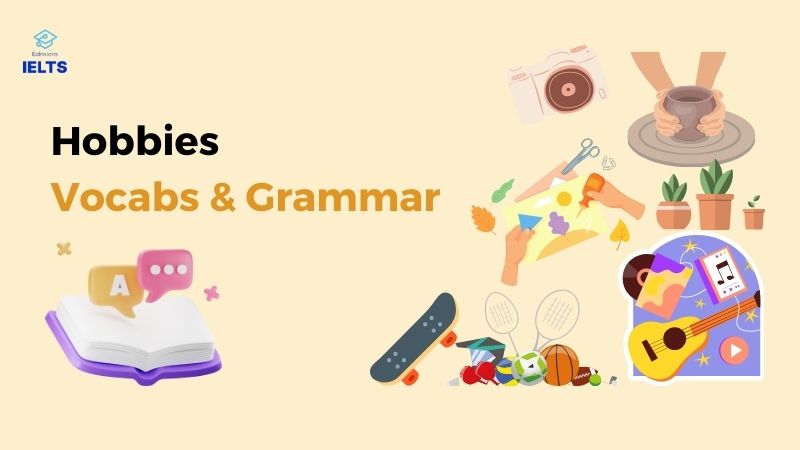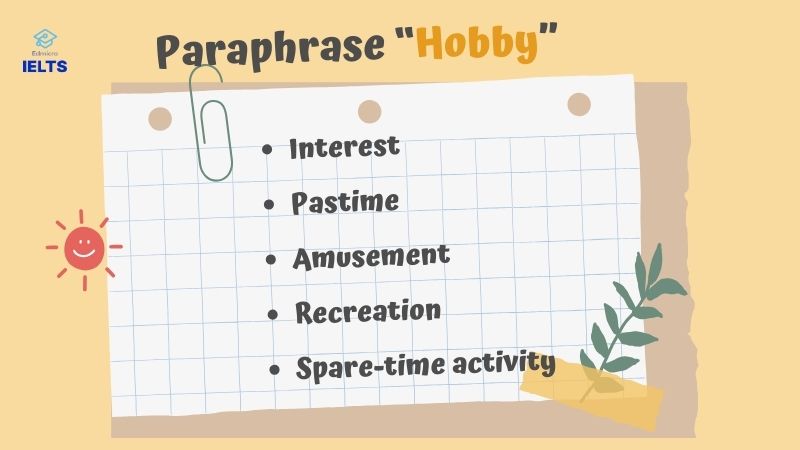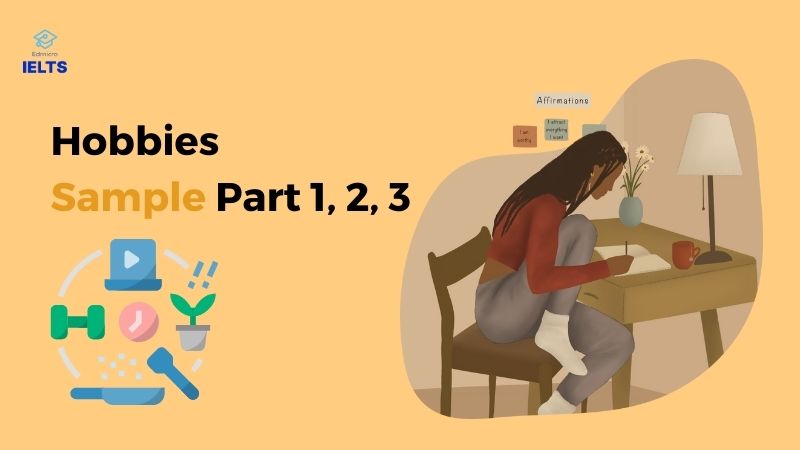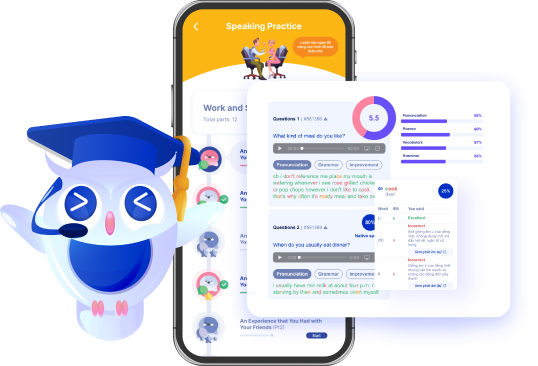Hobbies IELTS Speaking là chủ đề thường gặp trong bài thi nói. Đây là chủ đề không mới, tuy nhiên để lấy trọn điểm, thí sinh cần có sự đầu tư chuẩn bị kỹ càng cả về từ vựng và các lưu ý khi thi. Cùng Edmicro tìm hiểu chi tiết các bạn nhé!
Từ vựng chủ đề Hobbies IELTS Speaking
Chủ đề Hobbies – sở thích đòi hỏi một số nhóm từ vựng và các cấu trúc diễn đạt đặc thù. Việc bổ sung từ vựng và cấu trúc cũng tạo điểm sáng cho bài thi của bạn và giúp bạn ghi điểm trước giám khảo.

Từ vựng chủ đề Hobbies
Trong bài thi IELTS Speaking topic Hobbies, thí sinh sẽ phải sử dụng thường xuyên và bắt buộc một số nhóm từ vựng sau:
| Loại từ | Từ vựng | Phiên âm | Nghĩa | |
| Từ vựng chỉ hoạt động | Bungee jumping | /ˈbʌn.dʒi ˌdʒʌm.pɪŋ/ | nhảy bungee | |
| Climbing | /ˈklaɪmɪŋ/ | leo núi | ||
| Cycling | /ˈsaɪ.klɪŋ/ | đạp xe | ||
| Camping | /ˈkæm.pɪŋ/ | cắm trại | ||
| Hiking | /ˈhaɪkɪŋ/ | đi bộ đường dài | ||
| Kayak | /ˈkaɪæk/ | xuồng ca dắc | ||
| Scuba diving | /ˈskuːbə ˈdaɪvɪŋ/ | lặn biển | ||
| Shuttlecock kicking | /ˈʃʌt.əl.kɒk kɪkɪŋ/ | chơi đá cầu | ||
| Walking | /ˈwɔː.kɪŋ/ | tản bộ | ||
| Gardening | /ˈɡɑː.dən.ɪŋ/ | làm vườn | ||
| Backpacking | /ˈbækˌpækɪŋ/ | du lịch bụi | ||
| Kite flying | /ˈkaɪtˌflaɪ.ɪŋ/ | thả diều | ||
| Jogging | /ˈdʒɑː.ɡɪŋ/ | Chạy bộ | ||
| Do magic tricks | /duː ˈmæʤɪk trɪk/ | làm ảo thuật | ||
| Build things | /bɪld θɪŋz/ | chơi xếp hình | ||
| Collect things | /kəˈlɛkt θɪŋz/ | sưu tập đồ | ||
| Mountaineering | /maʊn.tənˈɪr.ɪŋ/ | Đi leo núi | ||
| Go partying | /gəʊ ˈpɑːtɪɪŋ/ | Đi dự tiệc | ||
| Go skateboarding | /gəʊ ˈskeɪtbɔːdɪŋ/ | trượt ván | ||
| Take photo | /teɪk ˈfəʊtəʊ/ | chụp ảnh | ||
| Hang out with friends | /hæŋ aʊt wɪð frɛndz/ | đi chơi với bạn | ||
| Knit | /nɪt/ | đan lát | ||
| Do sports | /duː spɔːts/ | chơi thể thao | ||
| Surf net | /sɜːf nɛt/ | Lướt net | ||
| Tính từ | Enjoyable | /ɪnˈdʒɔɪ.ə.bəl/ | Thú vị | |
| Passionate | /ˈpæʃ.ən.ət/ | say mê | ||
| Fascinating | /ˈfæs.ən.eɪt/ | Hấp dẫn | ||
| Satisfying | /ˈsæt.ɪs.faɪ.ɪŋ/ | thỏa mãn | ||
| Relaxing | /rɪˈlæk.sɪŋ/ | Thư giãn | ||
| Creative | /kriˈeɪ.tɪv/ | có tính sáng tạo | ||
| Practical | /ˈpræk.tɪ.kəl/ | thực tế, thiết thực | ||
| Amateur | /ˈæm.ə.tər/ | nghiệp dư | ||
| Artistic | /ɑːˈtɪs.tɪk/ | có tính nghệ thuật | ||
| Intellectual | /ˌɪn.təlˈek.tʃu.əl/ | có tính trí tuệ | ||
| Time-consuming | /ˈtaɪm.kənˌsjuː.mɪŋ/ | tốn thời gian | ||
| Trạng từ | Trạng từ chỉ tần suất | Always | /ˈɔːl.weɪz/ | Luôn luôn |
| Usually | /ˈjuː.ʒu.əl/ | Thường xuyên | ||
| Normally/ Generally | /ˈnɔː.mə.li//ˈdʒen.ə r.əl.i/ | Thông thường | ||
| Often/ Frequently | /ˈɒf.ən//ˈfriː.kwənt.li/ | Thường | ||
| Sometimes | /ˈsʌm.taɪmz/ | Thỉnh thoảng | ||
| Trạng từ chỉ mức độ | a lot | /ə lɒt/ | rất nhiều | |
| almost | /ˈɔːlməʊst/ | gần như | ||
| highly | /ˈhaɪli/ | hết sức | ||
| pretty | /ˈprɪti/ | khá là | ||
| quite | /kwaɪt/ | khá là | ||
| strongly | /ˈstrɒŋli/ | cực kì | ||
| perfectly | /ˈpɜːfɪktli/ | hoàn hảo | ||
Các từ đồng nghĩa với Hobby

Cấu trúc diễn đạt về Hobbies
| To be very interested in | Rất thích |
| To be crazy about | Phát cuồng cái gì đó |
| To have a passion for | Đam mê cái gì |
| To like/enjoy/love/fancy | Yêu thích |
| To be into sth/sb | Say mê điều gì/ ai đó |
| To be fond of sth/sb | Thích làm cái gì/ ai đó |
| Be one’s cup of tea | Là sở thích của ai đó |
| To enable sb to do sth | Có thể giúp (ai đó) làm gì… |
| To do lots of | To enable sb to do sth |
Xem thêm: Hướng Dẫn IELTS Speaking Friends Full 3 Part Đầy Đủ Nhất
Mẫu câu trả lời IELTS Speaking Hobbies
Chủ đề IELTS Speaking Hobbies có thể xuất hiện trong cả 3 phần của bài thi nói. Để bạn có sự chuẩn bị tốt nhất, Edmicro đã tổng hợp các mẫu câu trả lời cho các Part 1, 2, 3.

Mẫu câu trả lời IELTS Speaking Hobbies Part 1
Bạn có thể tham khảo các câu hỏi mẫu cho “IELTS Speaking on Hobbies” dưới đây.
1. Do you have any hobbies?
Yes, I definitely have a few hobbies that I enjoy. One of my favorite hobbies is reading. I’m an avid reader, and I find it to be a great way to relax and escape into different worlds. I usually read a variety of genres, from fiction to non-fiction, and it’s something I look forward to doing in my free time
Dịch:
Vâng, chắc chắn là tôi có vài sở thích mà tôi rất thích. Một trong những sở thích yêu thích nhất của tôi là đọc sách. Tôi là một người mê đọc sách, và tôi thấy đó là cách tuyệt vời để thư giãn cũng như thoát khỏi thực tại để bước vào những thế giới khác nhau. Thông thường, tôi đọc nhiều thể loại khác nhau, từ tiểu thuyết cho đến phi hư cấu, và đó luôn là điều tôi mong chờ được làm trong thời gian rảnh.
Từ vựng:
- an avid reader (n): người đọc nhiệt thành
2. What hobbies are popular in your country?
In my country, there is a wide range of popular hobbies. One of the most common hobbies is watching and playing sports, especially football. People here are enthusiastic about sports, and you’ll often find them playing or watching games at local stadiums or on TV.
Dịch:
Ở đất nước tôi có rất nhiều sở thích phổ biến. Một trong những sở thích phổ biến nhất là xem và chơi thể thao, đặc biệt là bóng đá. Người dân ở đây rất nhiệt tình với thể thao, và bạn sẽ thường thấy họ chơi hoặc xem các trận đấu ở sân vận động địa phương hoặc trên TV.
3. Is it important to have a hobby?
I think having a hobby is important. It provides relaxation, fosters personal growth, and can lead to valuable social connections. It adds balance and richness to our lives.
Dịch:
Tôi nghĩ rằng có một sở thích là điều quan trọng. Nó mang lại sự thư giãn, thúc đẩy sự phát triển bản thân và có thể tạo ra những mối quan hệ xã hội quý giá. Sở thích cũng giúp cuộc sống của chúng ta trở nên cân bằng và phong phú hơn.
4. What sort of hobbies would you like to try in the future?
In the future, I’m quite interested in exploring new hobbies. One that has always intrigued me is hiking. I’ve heard about the amazing outdoor trails and natural beauty in various places, and I think it would be a great way to stay active and connect with nature.
Additionally, I’d like to try my hand at learning a musical instrument, perhaps the piano. Music has always fascinated me, and I believe it would be a rewarding challenge to acquire this skill.
Dịch:
Trong tương lai, tôi khá hứng thú với việc khám phá những sở thích mới. Một sở thích luôn khiến tôi tò mò là đi bộ đường dài. Tôi đã nghe nhiều về những cung đường ngoài trời tuyệt đẹp và vẻ đẹp thiên nhiên ở nhiều nơi, và tôi nghĩ đó sẽ là một cách tuyệt vời để vận động cũng như gần gũi với thiên nhiên.
Ngoài ra, tôi cũng muốn thử học chơi một loại nhạc cụ, có lẽ là đàn piano. Âm nhạc luôn khiến tôi say mê, và tôi tin rằng việc học được kỹ năng này sẽ là một thử thách đầy ý nghĩa.
Từ vựng:
- rewarding challenge (n): điều khó khăn nhưng đáng tự hào
5. What free-time activity is the most popular for Vietnamese young people?
The most popular free-time activity for young people in Vietnam, from my observation, is hanging out with friends at cafes. Socializing at cafes is a significant part of Vietnamese culture, and it provides an opportunity for young people to relax, chat, and build relationships.
Dịch:
Theo quan sát của tôi, hoạt động phổ biến nhất của giới trẻ Việt Nam trong thời gian rảnh là tụ tập bạn bè ở quán cà phê. Việc giao lưu tại các quán cà phê là một phần quan trọng trong văn hóa Việt Nam, và nó mang đến cho các bạn trẻ cơ hội thư giãn, trò chuyện và xây dựng các mối quan hệ
Xem thêm: Leisure time IELTS Speaking: Xử Gọn 3 Part Với Các Sample Mới Nhất
Mẫu câu trả lời chủ đề Hobbies IELTS Speaking Part 2
Đề bài
Describe a hobby you enjoy
You should say:
- What the hobby is.
- How you got into this hobby.
- Why you enjoy it.
Explain how this hobby has had an impact on your life.
Bài mẫu 1
Well, a hobby I really enjoy is playing the guitar. It’s a passion I developed during my teenage years. I initially got into it because of my older brother, who was a skilled guitarist. I admired the way he could create beautiful melodies and wanted to learn that skill too. So, he started teaching me the basics, and I gradually fell in love with the instrument.
I enjoy playing the guitar for several reasons. First and foremost, it’s a fantastic way to unwind and relieve stress. Whenever I pick up the guitar, I forget about the worries of the day and immerse myself in the music. It’s like therapy for me. Additionally, playing the guitar allows me to express my emotions and creativity. I can compose my own songs and experiment with different music styles. It’s a form of self-expression that brings me a lot of joy.
This hobby has had a significant impact on my life. For one, it has broadened my social circle. I’ve connected with fellow musicians and formed a band, which has been an incredible experience. Moreover, my guitar playing has helped me cope with life’s challenges and stay positive. Whether it’s the satisfaction of mastering a new song or the joy of performing in front of an audience, this hobby has enhanced my confidence and overall well-being. It’s not just a pastime; it’s become an integral part of who I am.
Dịch:
À, một sở thích mà tôi thật sự rất thích là chơi đàn guitar. Đó là một niềm đam mê mà tôi đã nuôi dưỡng từ những năm tuổi teen. Ban đầu, tôi tiếp cận với nó là nhờ anh trai tôi – một người chơi guitar rất giỏi. Tôi ngưỡng mộ cách anh ấy có thể tạo ra những giai điệu tuyệt đẹp và cũng muốn học kỹ năng đó. Thế là anh bắt đầu dạy tôi những điều cơ bản, và dần dần tôi đã yêu cây đàn này.
Tôi thích chơi guitar vì nhiều lý do. Trước hết, đó là một cách tuyệt vời để thư giãn và giải tỏa căng thẳng. Mỗi khi cầm cây đàn lên, tôi quên hết mọi lo toan trong ngày và đắm chìm vào âm nhạc. Đối với tôi, nó giống như một liệu pháp tinh thần. Bên cạnh đó, chơi guitar còn cho phép tôi bày tỏ cảm xúc và sự sáng tạo của mình. Tôi có thể sáng tác những bài hát riêng và thử nghiệm với nhiều phong cách âm nhạc khác nhau. Đây là một hình thức tự thể hiện mang lại cho tôi rất nhiều niềm vui.
Sở thích này đã có ảnh hưởng đáng kể đến cuộc sống của tôi. Trước hết, nó giúp tôi mở rộng mối quan hệ xã hội. Tôi đã kết nối được với nhiều nhạc công khác và lập thành một ban nhạc, đó là một trải nghiệm tuyệt vời. Hơn nữa, việc chơi guitar đã giúp tôi đối mặt với những thử thách trong cuộc sống và giữ tinh thần lạc quan. Dù là cảm giác thỏa mãn khi chinh phục một bản nhạc mới hay niềm vui khi biểu diễn trước khán giả, sở thích này đều giúp tôi tự tin hơn và cải thiện sức khỏe tinh thần nói chung. Nó không chỉ đơn thuần là một thú vui giải trí; mà đã trở thành một phần không thể thiếu trong con người tôi.
Từ vựng:
- get into something (v): trở nên thích thú với cái gì
- skilled (adj): có kỹ năng
- First and foremost (idiom): Trên hết, hơn tất cả
- unwind (v): thư giãn
- immerse oneself in something (v): đắm chìm trong cái gì
- cope with something (v): giải quyết cái gì
Bài mẫu 2
One hobby that I really enjoy is jogging. I started this hobby about three years ago when I realized that I was spending too much time sitting in front of my computer and not getting enough exercise. At first, jogging felt tiring and even a bit boring, but gradually, it became one of my favorite activities.
I usually jog in the early morning in a park near my house. The fresh air and the quiet atmosphere make it the perfect time for me to start my day. I normally run for about 30 minutes, which is enough to energize me without making me too exhausted. Sometimes, during weekends, I go jogging with a couple of friends, and that makes it even more enjoyable.
Jogging has brought me many benefits. Firstly, it has significantly improved my health. I feel much stronger, I hardly ever get sick, and my stamina has increased a lot compared to before. Secondly, jogging helps me release stress. Whenever I feel overwhelmed with work or studies, going for a run clears my mind and lifts my mood instantly. Finally, this hobby has also helped me become more disciplined because I need to maintain a regular routine to get the best results.
The reason why I enjoy jogging so much is that it not only keeps me physically fit but also mentally balanced. Running gives me time to think, reflect, and sometimes even come up with solutions to my problems. It also gives me a sense of freedom when I run under the open sky.
In conclusion, jogging is more than just a form of exercise for me. It is a hobby that improves both my body and mind, and I believe I will continue doing it for many years to come.
Dịch:
Một sở thích mà tôi thật sự thích là chạy bộ. Tôi bắt đầu sở thích này khoảng ba năm trước khi nhận ra rằng mình dành quá nhiều thời gian ngồi trước máy tính và không tập thể dục đủ. Ban đầu, chạy bộ khiến tôi thấy mệt và hơi nhàm chán, nhưng dần dần, nó trở thành một trong những hoạt động yêu thích của tôi.
Tôi thường chạy vào buổi sáng sớm trong công viên gần nhà. Không khí trong lành và sự yên tĩnh khiến đây trở thành khoảng thời gian hoàn hảo để bắt đầu một ngày mới. Tôi thường chạy khoảng 30 phút, vừa đủ để tiếp thêm năng lượng mà không khiến tôi quá kiệt sức. Thỉnh thoảng vào cuối tuần, tôi chạy cùng vài người bạn, và điều đó khiến trải nghiệm thú vị hơn.
Chạy bộ mang lại cho tôi nhiều lợi ích. Trước hết, nó giúp cải thiện sức khỏe rõ rệt. Tôi cảm thấy khỏe mạnh hơn, hiếm khi bị ốm và sức bền cũng tăng nhiều so với trước. Thứ hai, chạy bộ giúp tôi giải tỏa căng thẳng. Mỗi khi cảm thấy quá tải với công việc hay học tập, chỉ cần chạy một vòng là đầu óc tôi trở nên minh mẫn và tâm trạng cũng tốt hơn ngay. Cuối cùng, sở thích này cũng giúp tôi rèn luyện tính kỷ luật vì tôi phải duy trì thói quen đều đặn để có kết quả tốt nhất.
Lý do tôi thích chạy bộ đến vậy là vì nó không chỉ giúp tôi khỏe mạnh về thể chất mà còn cân bằng về tinh thần. Chạy bộ cho tôi thời gian để suy nghĩ, nhìn lại bản thân và đôi khi còn tìm ra giải pháp cho vấn đề của mình. Nó cũng mang đến cảm giác tự do khi tôi chạy dưới bầu trời rộng mở.
Tóm lại, chạy bộ không chỉ là một hình thức tập luyện, mà còn là một sở thích giúp tôi khỏe mạnh cả về thể chất lẫn tinh thần. Tôi tin rằng mình sẽ tiếp tục duy trì sở thích này trong nhiều năm tới.
Mẫu câu trả lời IELTS Speaking Hobbies Part 3
Dưới đây là mẫu câu trả lời IELTS Speaking Hobbies Part 3 bạn có thể tham khảo.
1. Do you think men and women tend to have different types of hobbies?
In many cases, yes, men and women tend to have different hobbies due to societal expectations and upbringing. Men are often encouraged toward sports or technical hobbies, while women may lean towards activities like cooking or crafts. However, individual choices are increasingly diverse as society becomes more inclusive.
Dịch:
Trong nhiều trường hợp, đúng là nam và nữ thường có những sở thích khác nhau do kỳ vọng của xã hội và cách nuôi dạy. Nam giới thường được khuyến khích theo đuổi thể thao hoặc các sở thích mang tính kỹ thuật, trong khi nữ giới có xu hướng tham gia vào các hoạt động như nấu ăn hoặc thủ công. Tuy nhiên, lựa chọn cá nhân ngày càng trở nên đa dạng hơn khi xã hội ngày càng cởi mở và bao dung hơn.
Từ vựng:
- upbringing (n): sự dạy dỗ
- inclusive (adj): hòa nhập, bao hàm
2. Why do some people get obsessed with their hobby?
Some people become obsessed with their hobbies for various reasons. Firstly, hobbies often provide a sense of accomplishment and personal satisfaction. Secondly, hobbies offer an escape from the stresses of everyday life. Engaging in a favorite activity can be a form of relaxation and a way to temporarily disconnect from work or other responsibilities. Moreover, the social aspect of certain hobbies can drive obsession. If a hobby involves a passionate community or like-minded enthusiasts, individuals may become deeply involved to bond with others who share their interests.
Dịch:
Một số người trở nên say mê với sở thích của mình vì nhiều lý do khác nhau. Trước hết, sở thích thường mang lại cảm giác thành tựu và sự hài lòng cá nhân. Thứ hai, sở thích còn là một lối thoát khỏi những căng thẳng trong cuộc sống hằng ngày. Việc tham gia vào một hoạt động yêu thích có thể là một cách thư giãn và tạm thời tách khỏi công việc hoặc các trách nhiệm khác. Hơn nữa, khía cạnh xã hội của một số sở thích cũng có thể thúc đẩy sự say mê. Nếu một sở thích gắn liền với một cộng đồng đam mê hoặc những người cùng chí hướng, thì cá nhân có thể bị cuốn vào sâu hơn để gắn kết với những người có cùng mối quan tâm.
Từ vựng:
- like-minded (adj): có cùng suy nghĩ
3. Do you think hobbies that keep you fit are better than hobbies that you can do sitting down?
The preference for hobbies that keep you fit versus those done while sitting depends on individual choices. Active hobbies promote physical health, while sedentary hobbies offer mental stimulation and relaxation. It is totally a matter of personal preference and lifestyle.
Dịch:
Sở thích thiên về vận động giúp rèn luyện thể chất hay sở thích ngồi một chỗ phụ thuộc vào lựa chọn của từng cá nhân. Những sở thích năng động thúc đẩy sức khỏe thể chất, trong khi những sở thích tĩnh tại lại mang đến sự kích thích tinh thần và thư giãn. Tất cả hoàn toàn là vấn đề sở thích cá nhân và lối sống.
Từ vựng:
- sedentary (adj): ngồi nhiều
4. Do you think it can be a disadvantage to have too much free time?
Yes, having too much free time can indeed be a disadvantage. While leisure time is important for relaxation and pursuing hobbies, excessive free time can lead to boredom, lack of productivity, and a sense of purposelessness. It’s essential to strike a balance between work and leisure to maintain a healthy and fulfilling lifestyle.
Dịch:
Đúng vậy, có quá nhiều thời gian rảnh thực sự có thể là một bất lợi. Mặc dù thời gian nghỉ ngơi rất quan trọng cho việc thư giãn và theo đuổi sở thích, nhưng quá nhiều thời gian rảnh có thể dẫn đến sự nhàm chán, thiếu năng suất và cảm giác không có mục đích. Điều quan trọng là phải cân bằng giữa công việc và giải trí để duy trì một lối sống lành mạnh và trọn vẹn.
Từ vựng:
- a sense of purposelessness (n): cảm giác vô mục đích
5. Should people feel a duty to do something constructive in their free time?
Yes, I believe people should feel a duty to do something constructive in their free time. Engaging in constructive activities not only helps individuals grow and learn but also contributes to personal well-being and the betterment of society. It’s a valuable opportunity to develop skills, give back to the community, and find purpose beyond work or responsibilities
Dịch:
Vâng, tôi tin rằng mọi người nên cảm thấy có trách nhiệm làm điều gì đó mang tính xây dựng trong thời gian rảnh. Việc tham gia vào những hoạt động có ích không chỉ giúp mỗi cá nhân phát triển và học hỏi mà còn góp phần nâng cao đời sống tinh thần và sự tiến bộ của xã hội. Đây là một cơ hội quý giá để rèn luyện kỹ năng, đóng góp cho cộng đồng và tìm thấy ý nghĩa vượt ra ngoài công việc hay trách nhiệm thường ngày.
Từ vựng:
- constructive (adj): có tính xây dựng
6. Do people have more free time now than in the past?
The amount of free time people have can vary greatly depending on their individual circumstances and lifestyles. However, in many parts of the world, technological advancements and changes in work patterns have, in some cases, led to increased free time compared to the past. Automation and remote working, for example, have allowed for greater flexibility in some professions, potentially giving people more free time. Nonetheless, the perception of free time can be influenced by how individuals choose to use it, with some people feeling they have less free time due to busier schedules or higher expectations for productivity
Dịch:
Lượng thời gian rảnh mà mọi người có thể thay đổi rất nhiều, tùy thuộc vào hoàn cảnh và lối sống của từng cá nhân. Tuy nhiên, ở nhiều nơi trên thế giới, những tiến bộ công nghệ và sự thay đổi trong cách thức làm việc đã, trong một số trường hợp, giúp gia tăng thời gian rảnh so với trước đây. Ví dụ, tự động hóa và làm việc từ xa đã mang lại sự linh hoạt hơn cho một số ngành nghề, từ đó có thể giúp mọi người có thêm thời gian rảnh. Tuy nhiên, cách nhìn nhận về thời gian rảnh còn phụ thuộc vào cách mỗi cá nhân lựa chọn sử dụng nó; một số người có thể cảm thấy mình ít thời gian rảnh hơn do lịch trình bận rộn hơn hoặc kỳ vọng cao hơn về năng suất.
Hướng dẫn và mẫu câu trả lời chi tiết cho chủ đề Hobbies IELTS Speaking trên đây hi vọng sẽ giúp ích cho quá trình rèn luyện kỹ năng Speaking của bạn. Nếu còn gì thắc mắc về chủ đề này, đừng ngại liên hệ với Edmicro nhé!
Xem thêm











